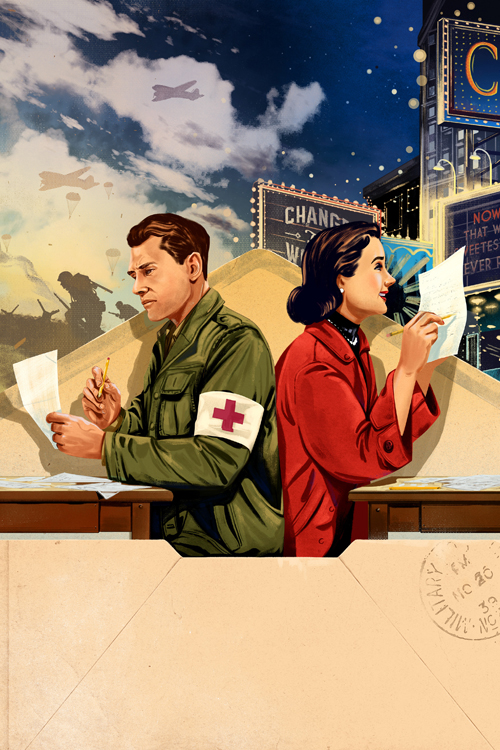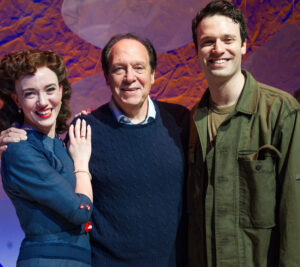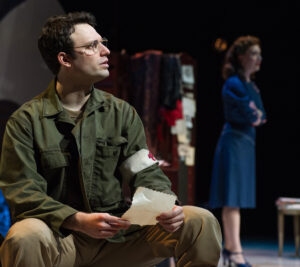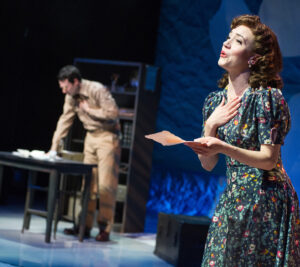The new play “Dear Jack, Dear Louise” is a typical boy-meets-girl story.
As long as your idea of typical is a West Coast-based Army doctor in 1942 introducing himself via letter to an aspiring actress in New York City. The two become pen pals who eventually fall in love, and their correspondence endures for three years while the forces of a war-torn world seemingly conspire to keep them from ever meeting face to face.
Playwright Ken Ludwig — a Tony Award winner for the Broadway productions of the farce “Lend Me a Tenor” in 1989 and the musical “Crazy for You” in 1992 — might have mined the depths of his creative mind to come up with such a concept.
But the inspiration for the two characters in “Dear Jack, Dear Louise,” running until Dec. 29 at Arena Stage in Washington, DC, came from a source much closer to his heart.
They’re his parents.
Actually, about 80 percent his parents, Ludwig said during a recent interview, tiptoeing around some of the parallels and differences between the Jack and Louise in the play and the Jack and Louise he knew until their deaths in the 1980s and ’90s.
You see, Ludwig would like to keep an element of narrative surprise intact. (Although, it’s not much of a spoiler to point out that, well, he was born.)
Nor is it a spoiler to say that the play, featuring Jake Epstein as Jack and Amelia Pedlow as Louise, is built entirely around the letters exchanged after Jack’s father — an old friend of Louise’s dad — arranges an introduction by mail.
As Jack and Louise share the stage, they speak aloud their written reflections on subjects such as her Broadway career dreams, his perspective on the horrors of war, and their burgeoning romance. The audience sees the pair grow ever closer — even when thousands of miles separate them.
Ludwig and his brother grew up hearing of the letters but never seeing them. The playwright eventually learned they’d been destroyed.
“My mom at some point decided her boys should not see these letters,” Ludwig said. “She must have thought they were too intimate. I was shocked, but I respect her decision.”
Armed instead with a lifetime of family lore, as well as a healthy dose of dramatic license, Ludwig dove into published troves of others’ World War II-era correspondence for additional inspiration. And having seen the success of mail-focused plays such as A.R. Gurney’s ever-popular “Love Letters,” he committed to the epistolary form of “Dear Jack, Dear Louise.”
“I wanted the play to showcase the nation’s courage and civility,” said Ludwig. “The wartime generation was so honest and so brave. Now is a very good time to tell this story.”
Although Ludwig regrets the loss of his parents’ wartime missives — “I’d give my right arm to see those letters” — he has countless other notes of theirs he treasures, especially from his years in college, graduate school and studying abroad.
“The most evocative thing is seeing their handwriting in letters,” he said. “When I do, I’m awash in emotion. It brings them back to me, even more than photos.”
He adds: “I love writing and receiving letters. They’re intimate by nature, they’re one-to-one, they’re long-form. You’re not just thinking about the recipient for the duration of a tweet or text. Sincerely. All my love. That kind of formality is a civilizing influence. Correspondence tells us things about people that nothing else does.”
Ludwig’s own letters are on a different trajectory from those behind “Dear Jack, Dear Louise.” As with many renowned writers, his papers are on track for acquisition by a major university, although a formal announcement has not yet been made.
Working on the play has also opened up new avenues of discussion with Ludwig’s son and daughter, both in their 20s.
“We’ve been talking a lot more about letters and family history,” Ludwig said. “They’re very interested in those subjects right now.”



